Written by Jenn Hand, Holistic Nutritionist, Board Certified Health Coach, NBC-HWC
If you’re reading this blog you’re probably wondering exactly how to stop bingeing at night.
Well, you’re in luck, because putting an end to binge eating is something I’ve helped many of my clients overcome.
I recently received an email from a panicked podcast listener who said:
“I eat so healthy all day and then at night, it all goes out the window! Help! Why do I want to binge eat at night? And what can I do to stop bingeing at night?”
It can be incredibly frustrating when you’ve been “good” during the day; you’ve made an effort to eat healthy and have stuck to your plan around food…but then come evening, all hell breaks loose and you can’t seem to stop eating.
Topics in This Article:
- So Why Do You Binge at Night?
- Here are 5 Ways to Help Stop Overeating at Night
- What To Do After Bingeing at Night (3 Bonus Tips!)
- How I Stopped My Own Bingeing Cycle (Personal Story)
- How Food Choices Affect Sleep
- How Binge Eating at Night May Affect Sleep
- Common Questions About How to Stop Bingeing at Night
- What’s Next?
So Why Do You Binge at Night?
There are many things that can contribute to a night binge.
Since we are not just machines – it’s not as simple as drink kale smoothies + run 5 miles = weight loss – our relationship to food is complicated. And if we want to learn how to stop binge eating at night, we need to understand the reasons why we fall into nighttime overeating in the first place.
Here are 3 of the biggest reasons why we binge at night:
1. Not Eating Regularly Throughout the Day
Often during the day, we try REALLLLLY hard to eat healthy/clean/good.
Or we’re distracted and try to eat “as little as possible” and we actually aren’t eating enough fuel for what our bodies need.
(**This can happen a lot of times when we’ve gained weight, have weight to lose, don’t like our bodies and are trying to secretly or not-so-secretly not “eat a lot”)
When evening time comes, we may actually NEED fuel, but our minds say “you shouldn’t be hungry, you just had dinner”.
We go back and forth with an exhausting mind battle, relentless food anxiety and then at some point, we give in to eating the food because we just want the darn battle to stop!
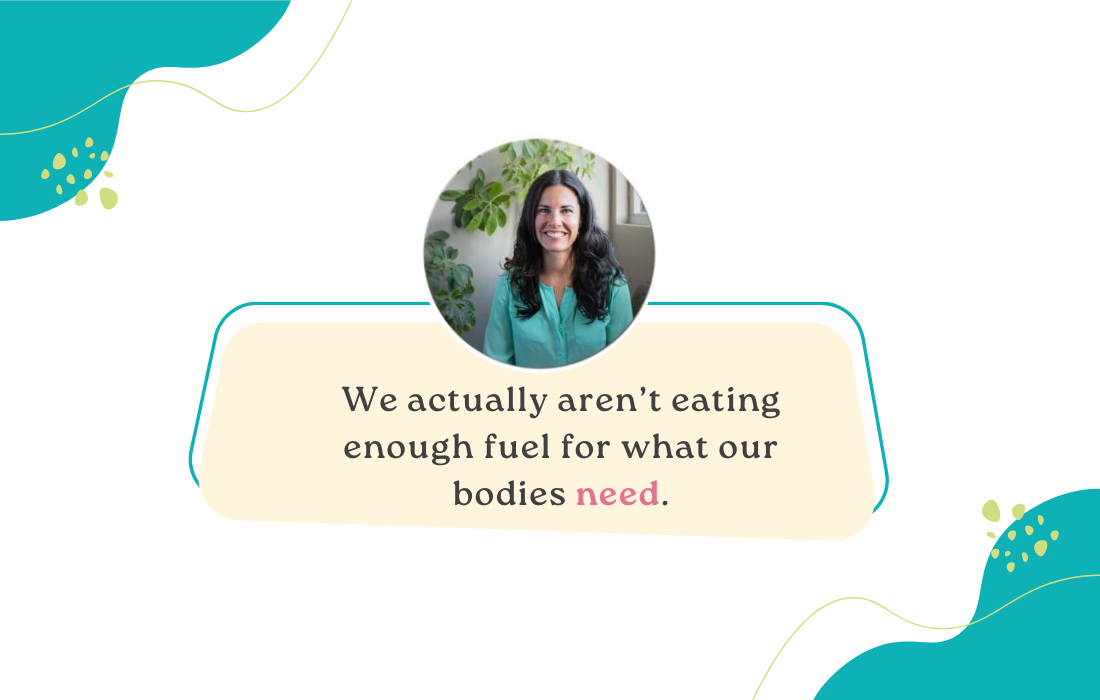
2. Not Managing Emotions
Emotions can be directly correlated to binge eating.
If we are prone to stress/boredom/loneliness eating, then this can just be exacerbated in the evening time.
It’s always post dinner–when the to-do list is done & the day’s tasks are nearing the end that we sit down on the couch for the first time… and the voice of the cookies call our name.
Our go-go-go world doesn’t usually have time for managing emotions throughout the day and we may use food as a reward, a de-stressor, a comfort or as something to do at night.
But not dealing with our emotions can be a huge factor in binge eating.
✅ Take the emotional eating quiz to find out if you tend to be an emotional eater >>

If we are prone to stress/boredom/loneliness eating, then this can just be exacerbated in the evening time.
3. It’s a Habit
Sometimes, eating can be a habit—we eat because it’s there, we snack because it’s the nightly routine, we turn to food because there’s nothing else to do when we sit on the couch.
If we’ve always turned to food, it’s become a well-worn habit that’s hard to break over time.
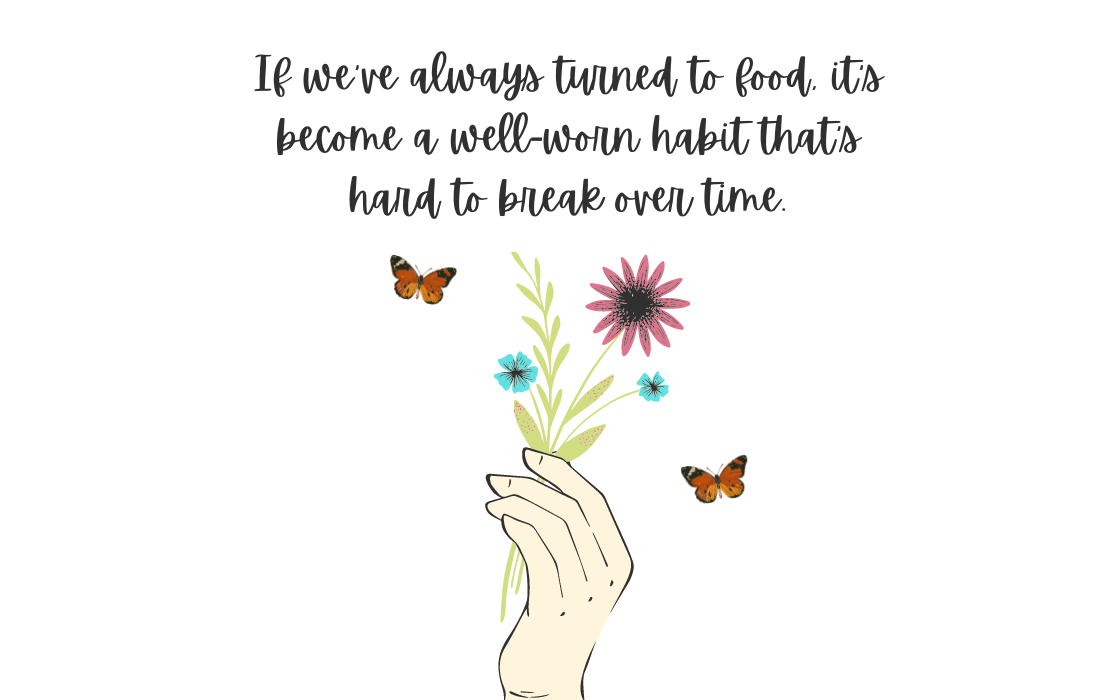
How to Stop Bingeing at Night
Here are 5 Ways To Help Stop Nighttime Binges in Their Tracks
1. Identify your triggers
What sends you to the food? Usually, those of us who’ve battled food have triggers—things that cause us to immediately to want to eat.
Is your trigger when your spouse is upstairs in the shower (and that’s when it’s “all clear” to binge)?
Is it having too many to-do’s?
Maybe it’s an overbearing boss, a partner you feel unappreciated around, a child that’s driving you nuts, a night of nothing to do or another person that causes that feeling of compulsion to the food.
It’s important to identify WHAT actually triggers you, so then you can work on setting up an alternate plan!

It’s important to identify WHAT actually triggers you, so then you can work on setting up an alternate plan!
2. Seek emotional support (Ask yourself, “Why am I eating?”)
When we aren’t physically hungry and eat, we are using food for a reason.
We eat to relieve boredom, cope with sadness, ease loneliness, comfort our anxiety, and heal a broken heart.
Food can be our reward, our way to give ourselves something, a way to forget our problems that we don’t know how to deal with.
It’s so important to explore your emotions and seek support to help you learn to move through them.
Journaling, coaching, therapy and support groups can be helpful tools in the process.
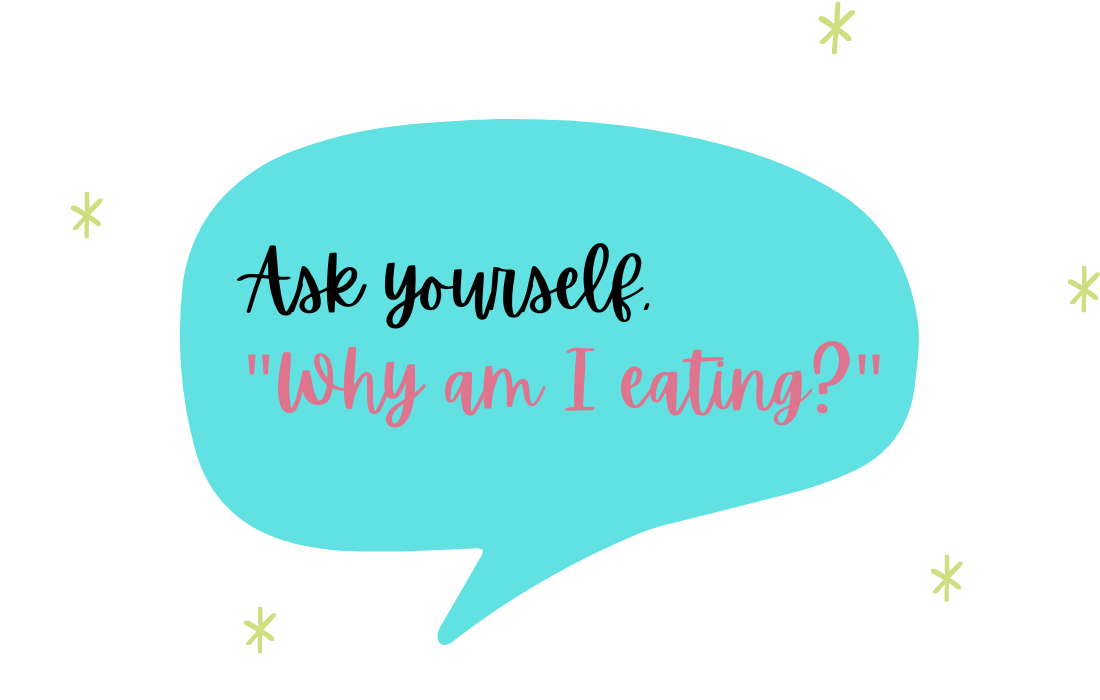
3. Include Protein at Every Meal
The more protein you have, the less sugar you crave.
From a physiological perspective, eating protein with our meals and snacks helps digestion to break down the fuel over a longer period of time.
You don’t get the dramatic spikes in your blood sugar you otherwise would if you’re eating a lot of sugar or quick digesting carbs.
Take a look at your protein intake and see if you can incorporate at least 12 grams each meal or snack. Notice how it impacts your sugar cravings.
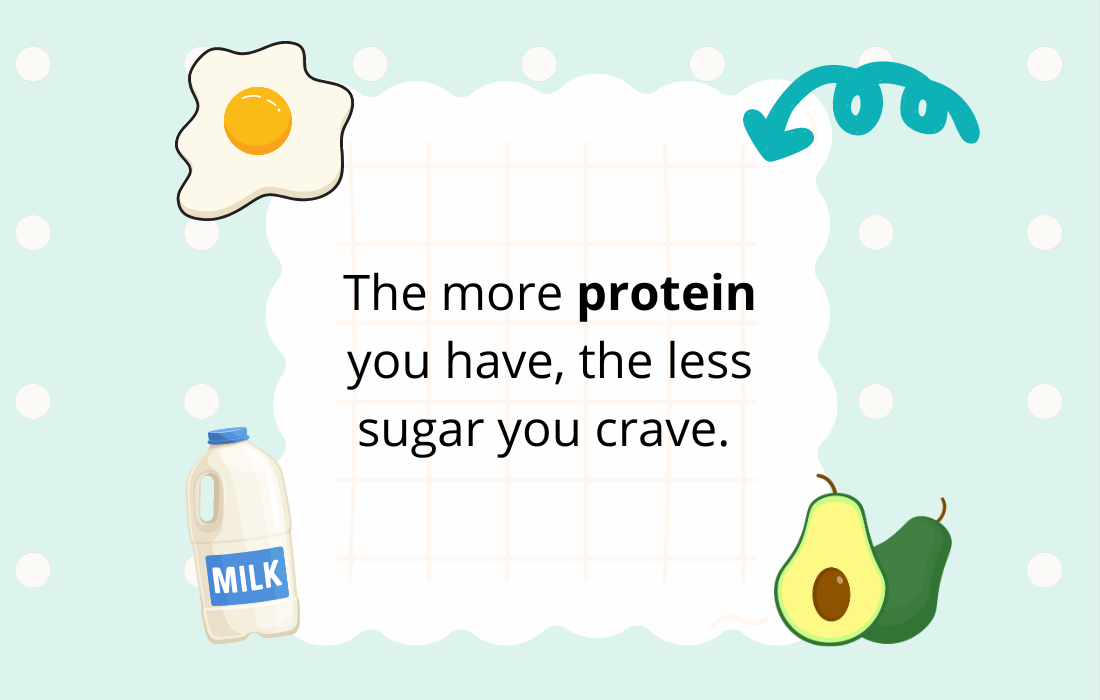
4. Break Associations & Create Transitions
When eating is a well ingrained habit, it can be helpful to break the association of the pattern and work to create a new habit.
If your association with relaxation is food, what else helps you feel relaxed? If your association is that as soon as you sit down on your couch you want chips, what other ritual can you create? Think about where your association is and begin to create a new transition around it.
For me, every time I used to come home from work, I’d drop my purse on the floor and walk to the pantry.
It was an association that I needed to create a new transition around. The old pattern was get home from work eat to destress.
I began working to create a transition from work to “home life” that helped let go of some of the well worn habit grooves of immediately going into the pantry.

I began working to create a transition from work to “home life” that helped let go of some of the well worn habit grooves of immediately going into the pantry.
5. Distract Yourself
Sometimes a good ole distraction can help you move through the desire to eat.
This may not work every time and for every person, but it is something to keep in your toolkit to practice in certain situations. I once had a client tell me she thought it was “failing” if she used a distraction to get through a food craving. She thought had to always “work through the emotions”.
But the reality is that distracting yourself can be a good tool to try out and see how it works for you.
- Brush your teeth
- Drink a glass of water
- Clean out a drawer or closet
- FaceTime family member or friend
- Do a craft
- Read your favorite novel
- Get outside to take a walk
- Leave the room
- Create art
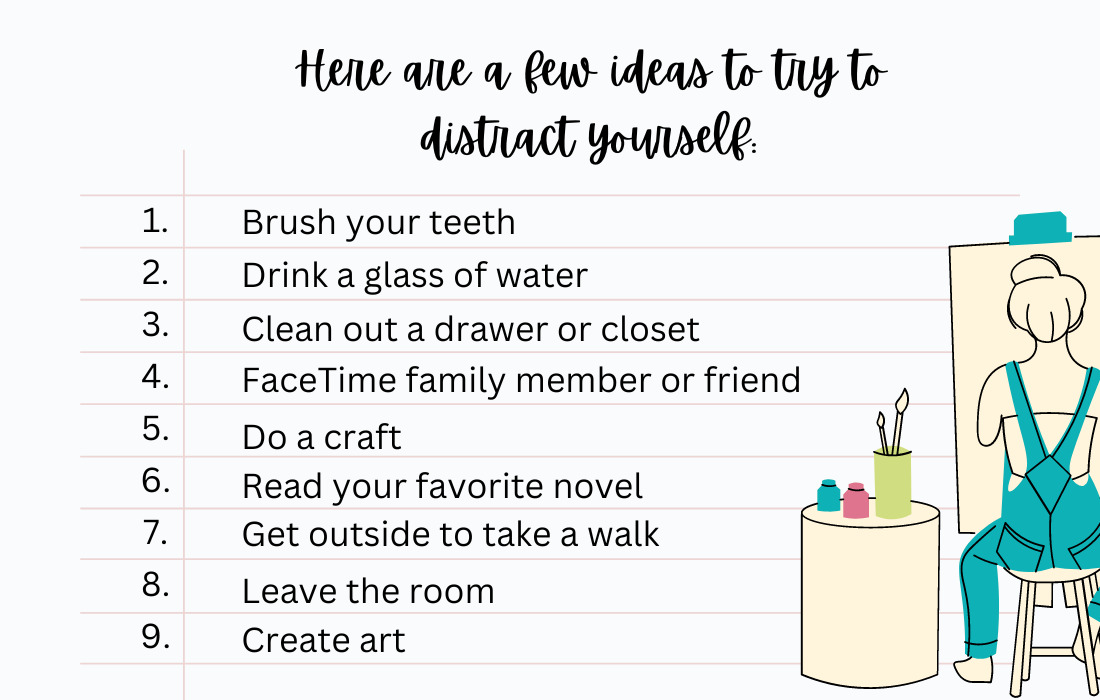
If you struggle with eating when you’re bored, check out this video here:
What to Do After Bingeing at Night? (3 Bonus Tips!)
When I was in the throes of the binge and restrict cycle, I often thought there was something wrong with me if I binged after I “knew better”.
“Why can’t I stop binging?! I know I’ll hate myself after I eat. So why do I do this to myself?! And what should I do if I overeat at night even though intellectually, I know other coping mechanisms?!”
If this resonates with you, you are not alone. Even when we are on the path to freedom around food and healing our food issues, we may still binge from time to time. But not to worry, I have an After-Binge Toolkit that’ll help you. It’s a really low-cost way to get some help and support if you’re struggling with binge eating.
🍏 Get the After-Binge Toolkit 🧰
If you want additional support, I’ve created an After-Binge Toolkit to help you recover.
So What To Do After Overeating at Night?
Forgive Yourself
Typically, post-binge we go down the self-loathing rabbit hole. We berate and hate ourselves, thinking that criticism will lead us to change.
But it never does. We can’t hate our way into change. What we need most after a binge is forgiveness. Forgive yourself for not knowing what else to do. For turning to food even though intellectually you “know better.” For being afraid of dealing with the feelings. After overeating at night, you need to be gentle with yourself.
Forgiveness can be a powerful balm to help you move forward after a binge.
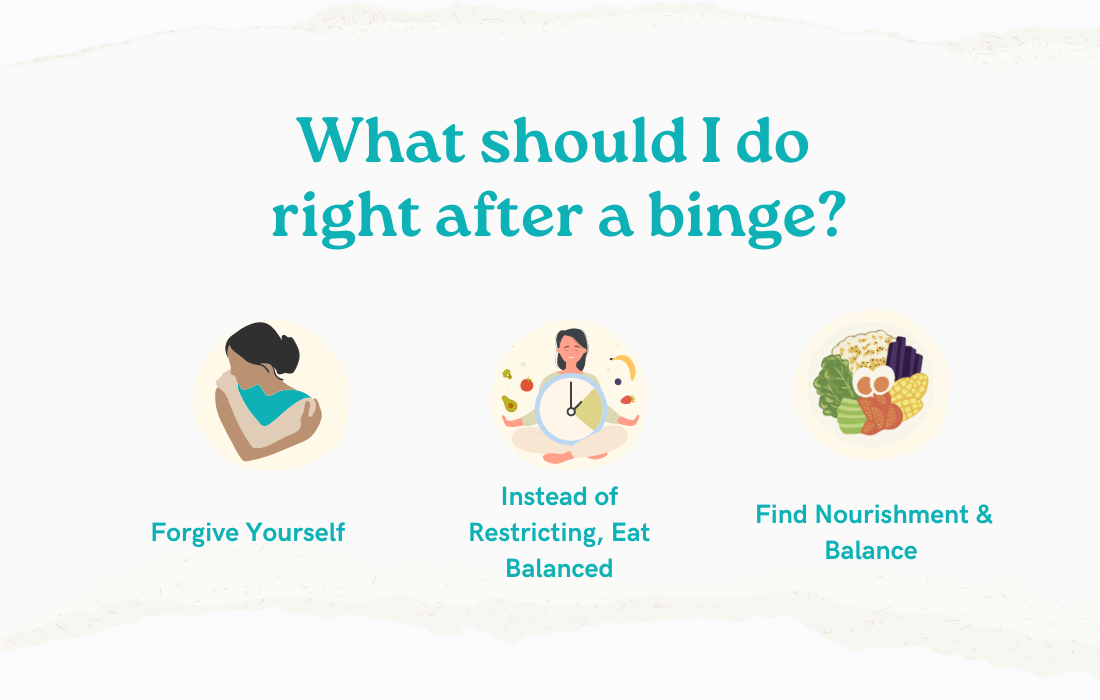
Don’t Starve as a Penance (Instead of Restricting, Eat Balanced)
When I used to binge at night, my “old” pattern would be to swear off all food, promise to start over tomorrow, and feel.
The problem was that restriction would always inevitably lead to… another binge. It’s the Law of Dieting. For every diet, there is a bihonge.
What would the middle ground look like for you?
How can you move through the desire to restrict to “make up for the binge” and help you find the middle ground?
Find Nourishment & Balance
After overeating, what would help you feel more balanced?
Typically we think in terms of “making up for”… but what if you focused on feeling balanced and nourishing yourself instead?
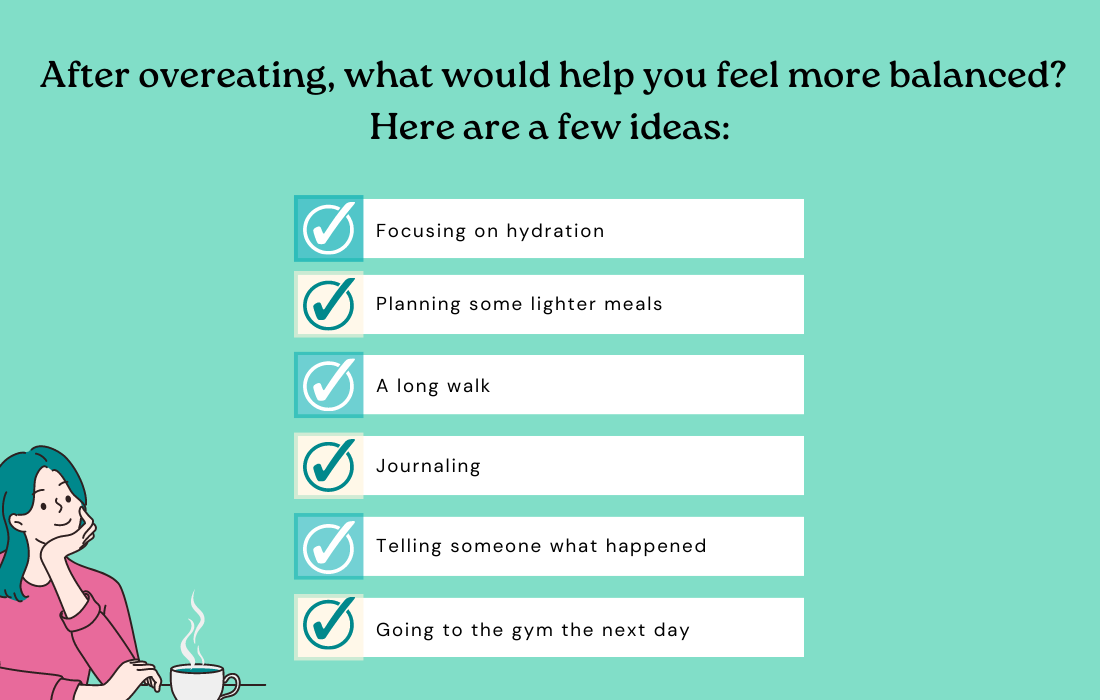
Here are a few ideas on how to find nourishment and balance:
- Focusing on hydration
- Planning lighter meals for the next few meals
- A long walk
- Journaling
- Telling someone what happened (this can help take some of the shame out of it)
- Going to the gym the next day (not to burn it off but to move your body)
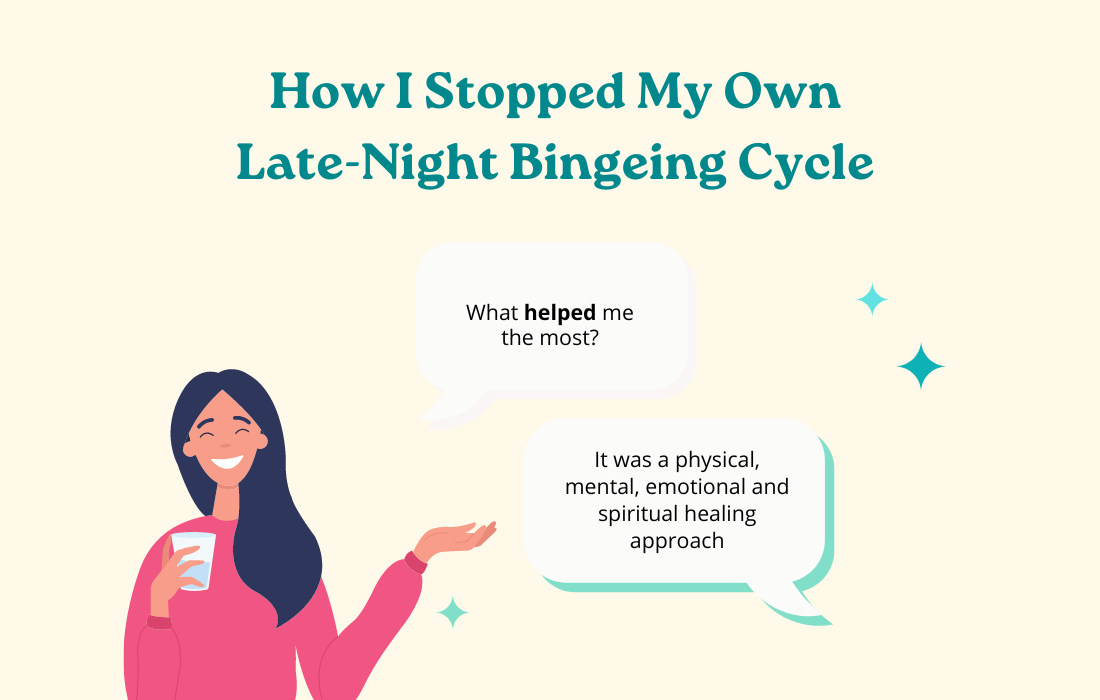
How I Stopped My Own Late-Night Bingeing Cycle
I lived almost one third of my life in either binge or restrict mode, and I didn’t know it was possible to eat “normally.”
I repeatedly gained and lost weight, each time more drastic than the last. Every night I’d end up bingeing. This was followed by a lot of “trying to get back on the wagon.”
What helped me the most? It was a four-pronged approach: physical, mental, emotional and spiritual healing.
I healed physically. I began eating protein and carbs every 3-4 hours. This is what I teach in the Normal Eaters Club. Although terrifying, I began learning to hear hunger and fullness. I made sure to keep my blood sugar even and didn’t go long, long stretches without eating.
Mentally, I worked on my body image and limiting beliefs. I began challenging food rules and learning slowly but surely to let go of the desperate control I thought I needed around food.
Emotionally, I started to learn how to feel emotions and what to do instead of eating over everything that happened in my life—whether it was boredom, anxiety, worry, happiness or sadness.
Spiritually, I went on an inner journey to try to fill the emptiness inside of me without food. I did lots of yoga, journaling and meditation. 🙂
In the throes of it, I didn’t know healing was possible.
I thought I’d have to deal with this for the rest of my life. Looking back, I see exactly why it all happened and how much I learned on my journey.
How Food Choices Affect Sleep
Food choices can impact the quality of your sleep.
Consuming large meals, caffeine, or alcohol close to bedtime can disrupt your sleep patterns by causing discomfort or stimulating your body. In a positive light, sleep-promoting foods like bananas, almonds, and herbal teas can help relax your body and improve sleep quality.
Opting for balanced meals that include a mix of protein, healthy fats, and complex carbohydrates earlier in the evening can help keep you balanced and prevent cravings.
How Binge Eating at Night May Affect Sleep
Binge eating at night can also affect sleep quality.
Eating large quantities of food late in the evening can lead to discomfort, indigestion, and an increased likelihood of waking up during the night due to discomfort in the body.
From a non-physical standpoint, feeling like a failure, getting angry at yourself, and feeling guilty after eating can create anxiety that may disrupt sleep when you can’t shut your mind or emotions off. Addressing nighttime binge eating can help improve your sleep patterns and overall health.
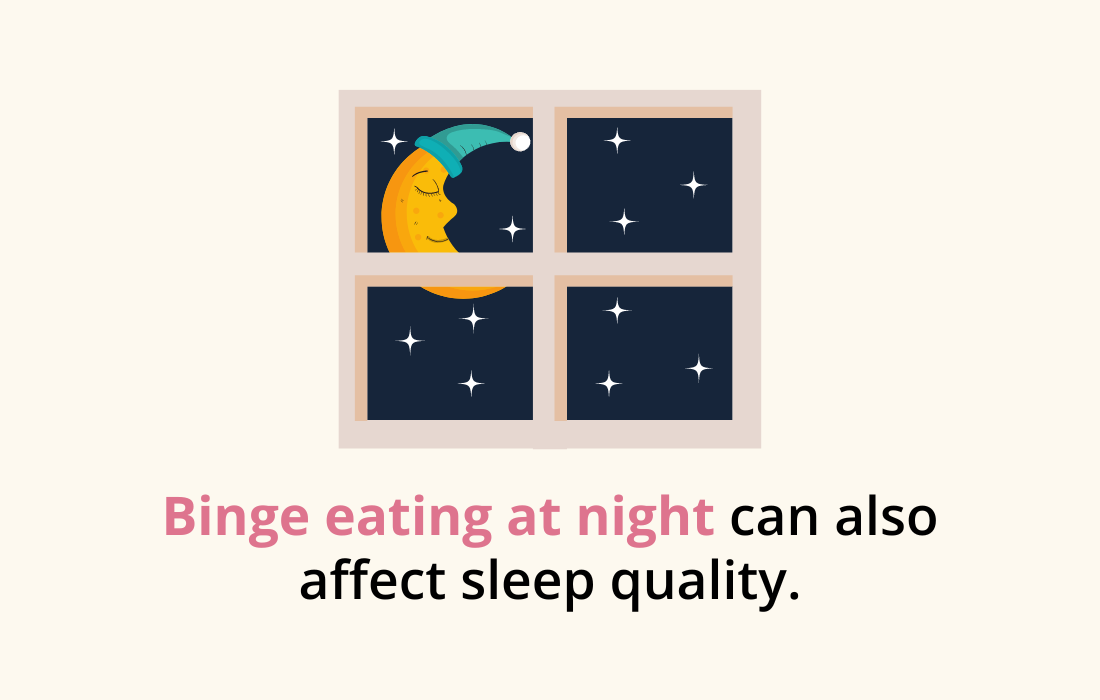
Common Questions About How to Stop Bingeing at Night
I have trouble sleeping at night; could this be causing my binge eating?
Yes, trouble sleeping can disrupt your body’s hunger hormones, leading to increased cravings and binge eating at night. There are of course, many other reasons, but this may contribute to overeating.
Can identifying triggers help stop nighttime binge eating episodes?
Identifying triggers is crucial as it helps you understand the root causes of your nighttime binge eating and develop strategies to address them.
How do you stop binge eating at night when you feel uncontrollable cravings?
To stop binge eating at night, try to go INTO the feeling inside–, practice deep breathing, do a guided meditation or box breathing to help slow you down. Grab your journal and write yourself through it in a pinch to help you move through it.
Are there any dietary methods to help binge eaters break their nightly eating habits?
Eating balanced meals throughout the day, including protein, fiber, and healthy fats, can help stabilize blood sugar levels and reduce nighttime cravings.
Does eating high-fat healthy food like Greek yogurt help to prevent nighttime binge eating?
Yes, eating high-fat healthy foods like Greek yogurt (and other healthy fats like avocados and nuts/seeds) can keep you feeling full longer, potentially preventing nighttime binge eating.
Can setting a weight loss goal help manage nighttime cravings? Or will it make them worse?
Setting a weight loss goal can sometimes make nighttime cravings worse by increasing stress and feelings of restriction.
Can meal planning and daytime eating habits prevent nighttime binges?
Yes, effective meal planning and healthy daytime eating habits can help prevent nighttime binges by ensuring you’re adequately nourished and less likely to experience extreme hunger at night.
What is “night eating syndrome?”
“Night eating syndrome” is considered to be an eating disorder characterized by consuming a significant portion of daily calories during the night and having trouble sleeping. It’s not a commonly used term.
What role does hydration play in curbing midnight cravings?
Staying hydrated can help curb midnight cravings, as thirst is sometimes mistaken for hunger, leading to unnecessary snacking.
How is a “binge eating disorder” different from occasional overeating?
A “binge eating disorder” is characterized by frequent, uncontrollable episodes of eating large amounts of food, often accompanied by feelings of guilt and distress, whereas occasional overeating is less frequent and typically does not involve such intense emotions.
Is binge eating considered to be an “eating disorder”?
Not all binge eating is considered to be an eating disorder.
Occasionally, binge eating may be recognized as a mental health condition that requires appropriate treatment, but it may also be less serious and not categorized as a full-blown disorder.
What are some signs of eating disorders related to binge eating at night?
Signs of eating disorders related to binge eating at night include frequent episodes of consuming large quantities of food, eating in secret, feelings of shame or guilt after eating, and disrupted sleep patterns.
How many hours before bed should you stop eating for weight loss?
While individual needs may vary, it’s generally recommended to stop eating at least 2-3 hours before bed to support weight loss and promote better digestion and sleep quality.
What’s Next? Get the “4 Ways to Stop a Binge” Guide!
Download the guide I created to help you learn how to stop bingeing at night.
Want to halt a binge in its tracks?
Grab the FREE guide: 4 Simple Ways to Stop a Binge!
More Articles About Holistic Weight Loss and Intuitive Eating
⚪ How to Get Off the Diet Roller Coaster
⚪ 7 Myths of Weight Loss
⚪ If You’re Not Dieting, How Will You Lose Weight?
Get the Normal Eater’s Newsletter
Join 8000+ women who are overcoming overeating, binge eating, and breaking up with dieting forever. Get Jenn’s inspiring and actionable weekly newsletter with the latest posts, podcasts, and tips on how to love your body, find food freedom, and lose weight holistically.
Get the Normal Eater’s Newsletter
Work with an Emotional Eating & Holistic Nutrition Coach
Overcome Bingeing and Emotional Eating, and Break Up with Yo-yo Dieting
Working with an emotional eating coach and holistic nutritionist can help you get free from the frustrating binge and restrict cycle and stop yo-yo dieting.
You don’t have to be obsessed with food or have a million rules around eating to find your natural weight and learn to love your body. Ready to actually see a lasting change and experience true freedom?
Click here to schedule a 20-minute introductory coaching call.
About the Author:
Jenn Hand has been helping women like you become normal eaters since 2015.
She’s worked with thousands of women, helping them to balance their bodies, end bingeing, stop obsessing over food, and start feeling amazing again. As a board-certified health coach and holistic nutritionist, Jenn knows how to support you in making real positive changes that last.
Her articles have been published on Mind Body Green, Tiny Buddha, Thrive Global and other local and global media platforms. She’s the author of How to Be a Normal Eater and the creator of The Normal Eater’s Club program. Listen to Jenn’s advice and tips on the Cake Doesn’t Count Podcast, or read more of her articles for free on the Food Freedom Blog.

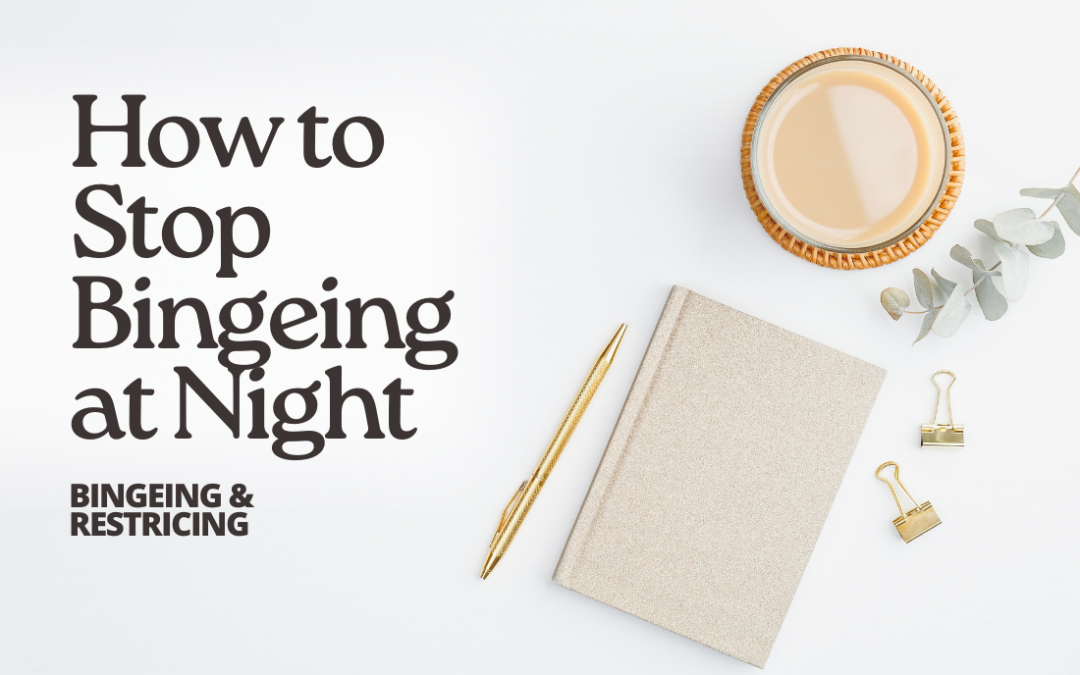
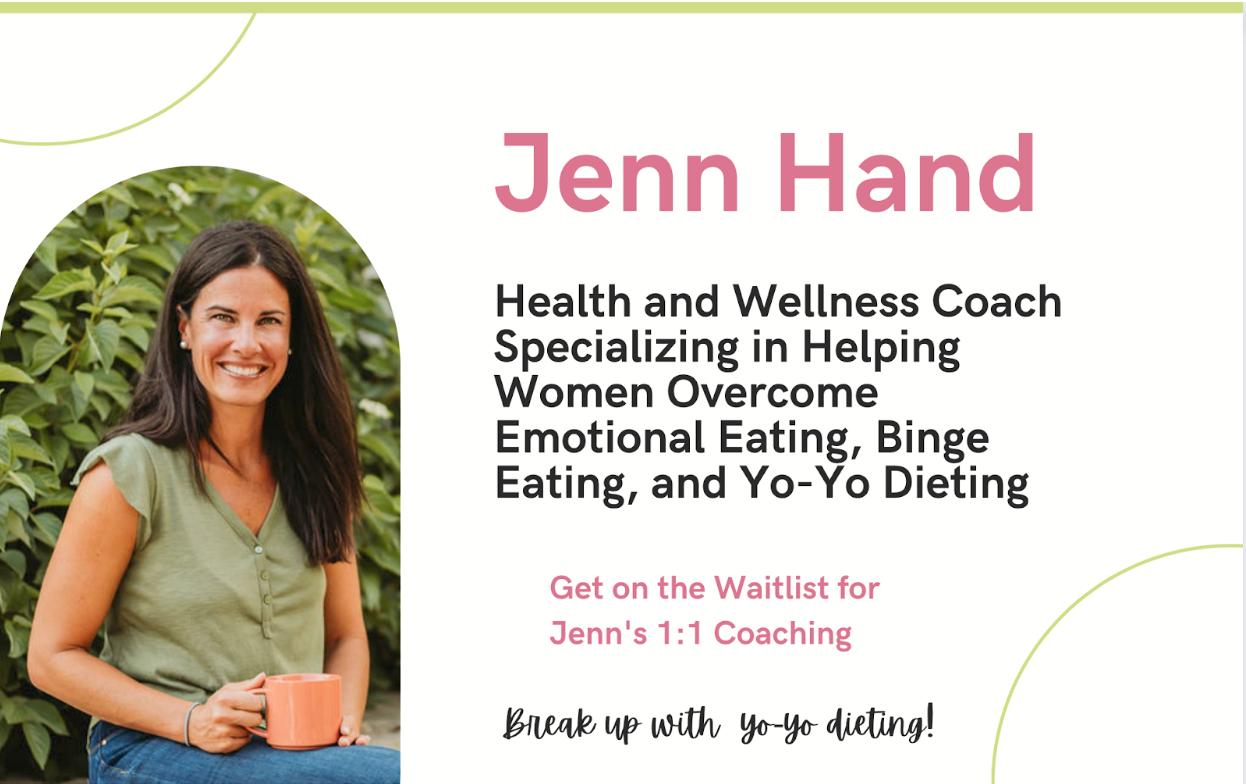




I read your entire blog & it was like reading my relationship with food. I overcame my night binging by changing my habits. I fall back all the time but I keep starting over & have managed to maintain my weight loss of 60 lbs for 5 years. It’s a lifetime change! My doctors words are always in the back of my head there is No healthy snacking because you should not be snacking! If you’re hungry eat food! Snacking is a habit!
I’m glad it resonated with you 🙂 I love that “eat food”! It’s so simple yet powerful!